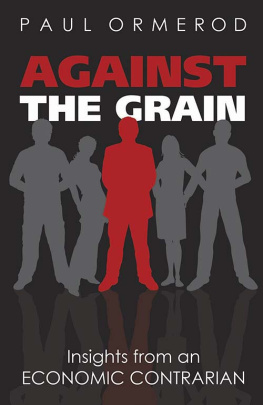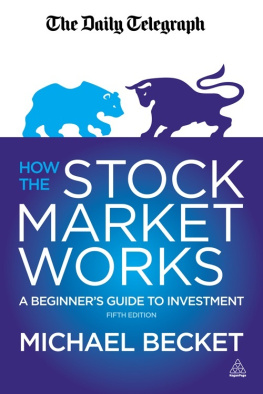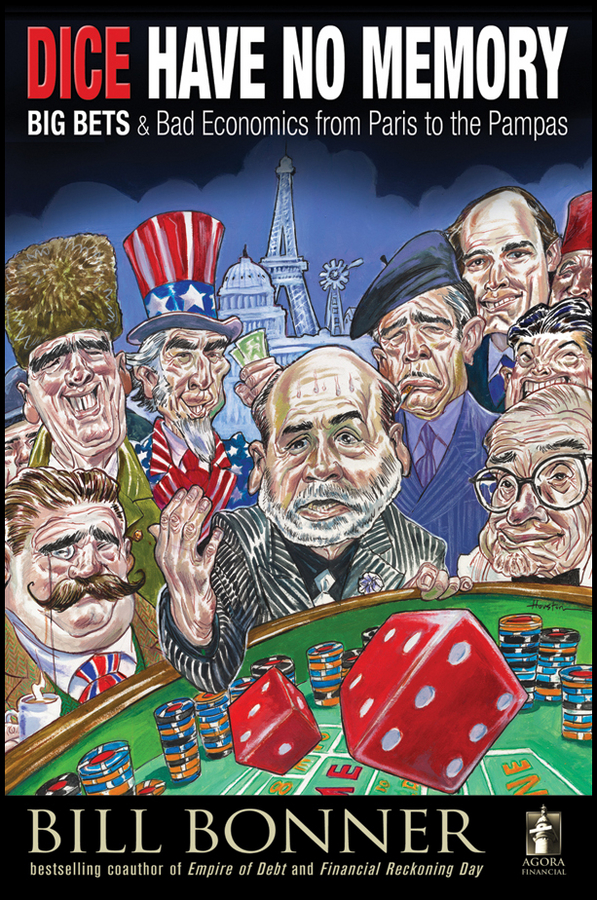Contents
Praise for Bill Bonner from Dear Readers of The Daily Reckoning
As a follower of Bill Bonners Daily Reckoning from its beta days more than 10 years ago, I find the DR over the years has been the best guide available on money and the national and international economic picture, bar none. Here pounding sand in the oil patch in the Middle East, I eagerly await availability of Bills next book.
Curtis T.
You make more sense in one e-mail than a month of CNBC.
Ken K.
Eloquent and elegant musings on the apocalypse, leavened with humor and a profound appreciation of human folly.
Chris H.
Ive been a Daily Reckoner since 2007, when I decided the mainstream financial media really didnt know what they were doing. I decided to figure out how world markets really worked. I remember the first Reckoning I read, about the history of gold as money. I read it twice, and Ive been addicted ever since. I didnt lose a cent during the meltdown of 08 and have watched my net worth soar since, but what I am really thankful for is the knowledge of world markets Ive gained these past few years. Bills writings have really taught me to think like a contrarian, and think for myself.
Matt W.
Bill Bonners clarity of thinking is astounding! I only wish our leaders and the population would study the point that Bill has mastered: How do you learn to think! And then apply it.
Steven F.
It is rare to find an honest voice in the world of finance. So reach around and pat yourself on the back; you just might touch my hand as you do.
Jerry C.
I enjoy reading Bonner a lot! One of the best financial reads ... financial thoughts put across in a factual and most humorous way!
Lakshminarayanan K.
Best well-rounded economic commentator of the new century.
Peter L.
Mr. Bonner is a man of rare intelligence and culture, and I enjoy reading his Reckoning s every day.
Henri V.
Your style is so personal and down to earth; it is difficult to remember your audience is bigger than just me!
John B.
The first thing I hear when I come up from my office downstairs every morning is Did The Daily Reckoning arrive yet? My wife thinks its the best thing since the Internet; me, too!
Jack C.
What a refreshingly witty, erudite, finger-wagging, sensible, and insightful piece.
Elaine
What Ive enjoyed most from Bill Bonners comments are his bemused and skeptical attitude toward the everyday market and his ability to evaluate the daily nonsense in the clear light of his own values. I find that not many can do that. He is willing to stand apart from the crowd and point out that the emperor is, well, ah, er, naked.
John
I thoroughly enjoy your Daily Reckoning and have quite unabashedly become addicted to your mental agility. You fall into the category of Mencken and Buckley and other essayists for whom I have the highest regard.
Robert O.

Copyright 2011 by William Bonner. All rights reserved.
Published by John Wiley & Sons, Inc., Hoboken, New Jersey.
Published simultaneously in Canada.
No part of this publication may be reproduced, stored in a retrieval system, or transmitted in any form or by any means, electronic, mechanical, photocopying, recording, scanning, or otherwise, except as permitted under Section 107 or 108 of the 1976 United States Copyright Act, without either the prior written permission of the Publisher, or authorization through payment of the appropriate per-copy fee to the Copyright Clearance Center, Inc., 222 Rosewood Drive, Danvers, MA 01923, (978) 750-8400, fax (978) 646-8600, or on the Web at www.copyright.com . Requests to the Publisher for permission should be addressed to the Permissions Department, John Wiley & Sons, Inc., 111 River Street, Hoboken, NJ 07030, (201) 748-6011, fax (201) 748-6008, or online at http://www.wiley.com/go/permissions .
Limit of Liability/Disclaimer of Warranty: While the publisher and author have used their best efforts in preparing this book, they make no representations or warranties with respect to the accuracy or completeness of the contents of this book and specifically disclaim any implied warranties of merchantability or fitness for a particular purpose. No warranty may be created or extended by sales representatives or written sales materials. The advice and strategies contained herein may not be suitable for your situation. You should consult with a professional where appropriate. Neither the publisher nor author shall be liable for any loss of profit or any other commercial damages, including but not limited to special, incidental, consequential, or other damages.
For general information on our other products and services or for technical support, please contact our Customer Care Department within the United States at (800) 762-2974, outside the United States at (317) 572-3993 or fax (317) 572-4002.
Wiley also publishes its books in a variety of electronic formats. Some content that appears in print may not be available in electronic books. For more information about Wiley products, visit our web site at www.wiley.com .
Library of Congress Cataloging-in-Publication Data:
Bonner, William, 1948
Dice have no memory : big bets and bad economics from Paris to the Pampas / William Bonner.
p. cm.
Includes index.
ISBN 978-0-470-64004-3 (cloth); ISBN 978-111-8-05796-4 (ebk);
ISBN 978-111-8-05812-1 (ebk); ISBN 978-111-8-05813-8 (ebk)
1. Money marketHistory21st century. 2. FinanceHistory21st century. 3. Investment analysis. I. Title.
HG226.B66 2011
332'.042dc22
2010051234
To my mother, Anne Bonner, with much appreciation
Introduction
It was 10 years ago, or a bit more, that I began writing the Internet series called the Daily Reckoning . The collection of essays and short notes you have in your hands developed over the course of the years that followed.
When I began, I was ahead of the innovation curve. I was blogging before blogs had been invented. Day after day, I watched what happened in the world of finance, economics, and politics. And day after day, I found myself entertained. I merely described what I saw happening.
This was something fairly new in the press. Journalists believe their job is to report the facts, not to laugh at them. Even the commentariat and editorialists believe they need to take the news seriously; who will buy their papers and magazines if they make a joke of it? The lectorat, too, had become convinced that the world of finance, investments, and economics was serious business. Many believed that the latest developmentsboth in technology as well as in financial theorywould make them rich. They had heard that the Internet made wealth secrets available to everyone. You could now go onto the Internet to find out how to make a nuclear bomb, or a fortune. Stocks for the long run seemed like an almost risk-free road to riches. Readers werent going to pay someone to mock their ambitions and undermine their hopes.
But the Daily Reckoning was free. Readers could not complain that they were not getting their moneys worth.
The period began with a bubble in the dot.com stocks. Back then, investors believed they could make money by buying companies listed on the Nasdaq, even those that had no plausible way of making money. Often, these new-technology dot.com companies were managed by people with no business experience. Indeed, the lack of a track record was seen as a benefit. Ideally, what investors looked for was a callow CEO with his baseball cap on backward, who spoke the gibberish of the era. Incoherence and pimples were all the evidence they needed that the company was run by an Internet genius, untarnished by the rules and lessons of the old economy.









